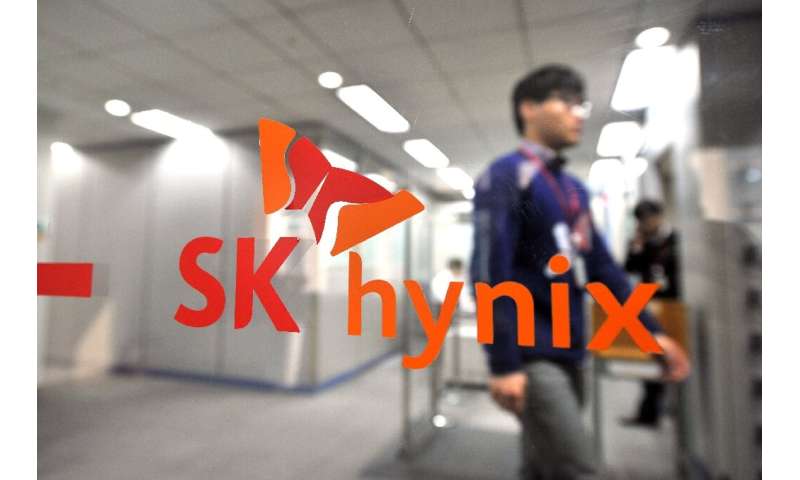#SK Hynix in $9 bn deal for Intel’s flash memory chip business

“#SK Hynix in $9 bn deal for Intel’s flash memory chip business”

The world’s second-largest chipmaker, South Korea’s SK Hynix, announced a record $9 billion deal Tuesday to buy Intel’s flash memory chip operation as it seeks to bolster its position against rival behemoth Samsung Electronics.
SK Hynix is already the world number two maker of DRAM chips, used in computers and servers, and the second-largest chipmaker overall.
But it has lagged in the market for flash memory—or NAND—chips, which are used in everyday devices such as smartphones and USB storage drives, as well as industrial and medical equipment.
In a regulatory filing, SK Hynix said it will acquire Intel’s “entire NAND business division excluding the Optane division” for 10.3 trillion won, with Intel’s factory in Dalian, China, included in the deal.
It is the largest-ever acquisition by a South Korean company, ahead of Samsung Electronics’ $8 billion purchase of US audio and car parts maker Harman International in 2016.
SK Hynix CEO Seok-Hee Lee said in a statement it would give his firm a NAND flash market position “comparable with what we achieved in DRAM”.
And analysts said it would boost its ability to compete with Samsung Electronics, the market leader in both the NAND and DRAM sectors.
The pair are engaged in ferocious competition around the world, supplying chips to customers from American giants such as Apple and Dell to Chinese companies, and demand has boosted their profits in recent years.
SK Hynix ranked fourth by global NAND sales in the second quarter this year, according to market researcher Trendforce. Intel was sixth.
Their combination will see SK Hynix leapfrog Japan’s Kioxia—formerly Toshiba—and Western Digital of the United States into second place with a NAND market share of more than 23 percent.
“With the deal, the company has firmly cemented its second-largest position in the global semiconductor industry,” said Ahn Ki-hyun, vice-president of the Korea Semiconductor Industry Association.
“In the long run, the deal paves a way for it to become more competitive against Samsung,” he added.
‘Super Gap’
The Samsung Electronics and SK Hynix headquarters are both south of Seoul and less than 50 kilometres (31 miles) apart, from where they dominate the global branded memory chip market.
Between them they accounted for around 60 percent of total sales in the second quarter of this year according to the Trendforce figures.
The South Korean firms have achieved their commanding position by adopting a “Super Gap” strategy, said Howard Lee, managing director of investment banking advisors BDA Partners—investing vast sums unusually early “to build a strong entry barrier that followers cannot overcome”.
Samsung Electronics, he told AFP, “usually invests around $30bn a year, widening the gap in technology with competitors”.
The approach was only possible because of the companies’ family-controlled structures, he added.
Samsung Electronics is the flagship subsidiary of the Samsung group, by far the largest of the family-controlled conglomerates known as chaebol that dominate business in the world’s 12th-largest economy.
For its part SK Hynix is part of the SK Group, the third-largest chaebol, while the original Hynix was owned by the Hyundai group before a $2.2 billion merger that Lee advised on.
The “strong and stable ownership of Korean conglomerates” enabled them to adopt far-sighted, decades-long plans such as the “Super Gap”, he said.
“As the huge investment could harm profitability and shareholder value in a short term,” he explained, such large and risky moves would be difficult for more “democratic” competitors with hired CEOs and shorter-term horizons.
SK Hynix is the second most valuable company listed on Seoul’s KOSPI stock market with a market capitalisation of 62 trillion won, behind only Samsung Electronics.
But SK Hynix shares were down almost two percent on the announcement in afternoon trade.
SK Hynix posts lowest profit in three years
© 2020 AFP
Citation:
SK Hynix in $9 bn deal for Intel’s flash memory chip business (2020, October 20)
retrieved 20 October 2020
from https://techxplore.com/news/2020-10-sk-hynix-bn-intel-memory.html
This document is subject to copyright. Apart from any fair dealing for the purpose of private study or research, no
part may be reproduced without the written permission. The content is provided for information purposes only.
For forums sites go to Forum.BuradaBiliyorum.Com
If you want to read more Like this articles, you can visit our Science category.

